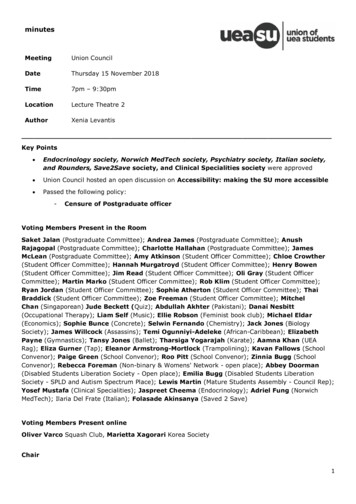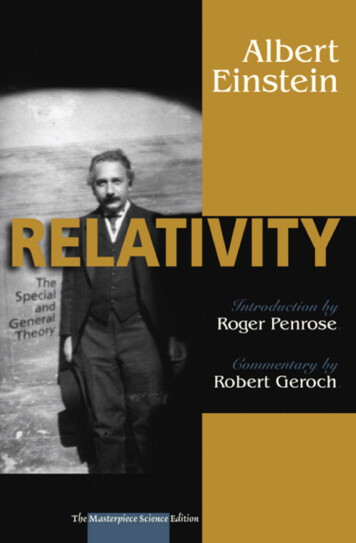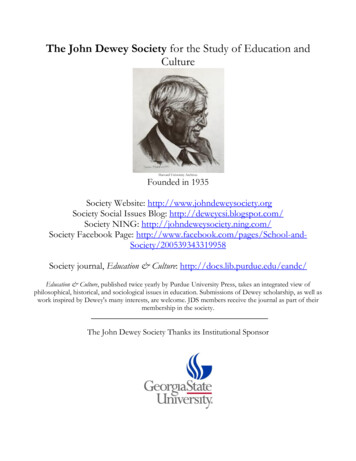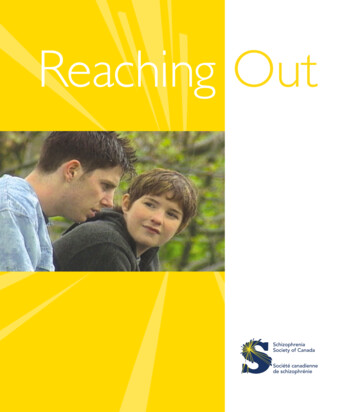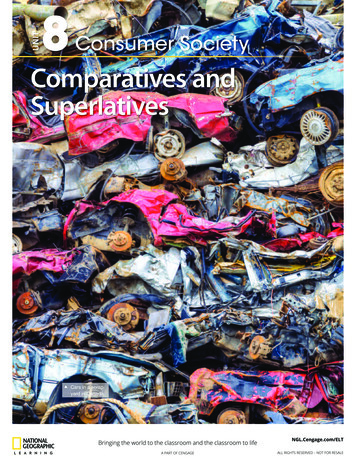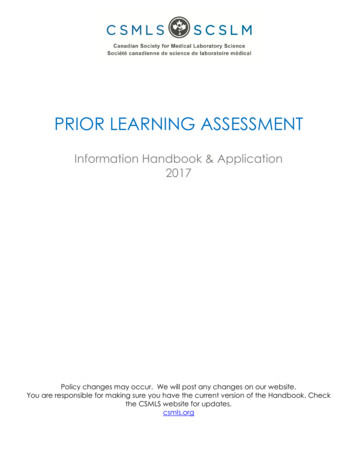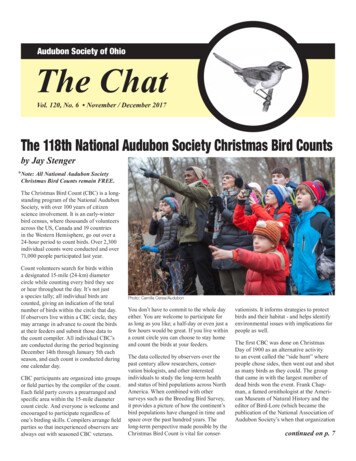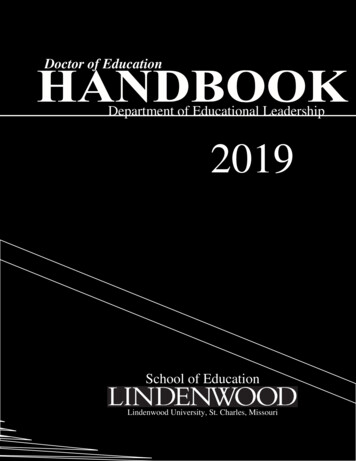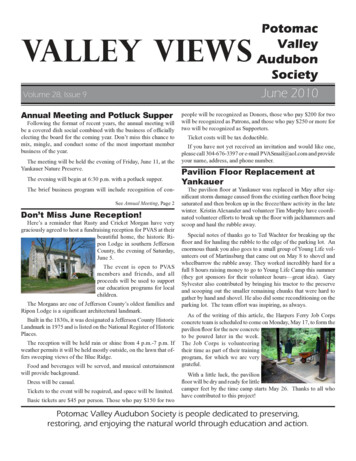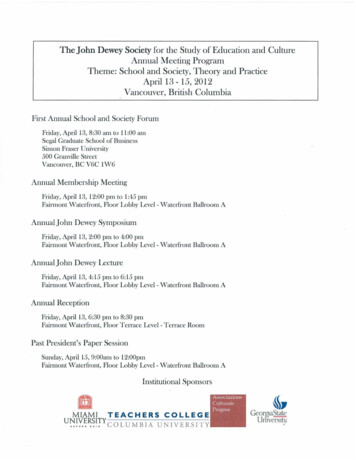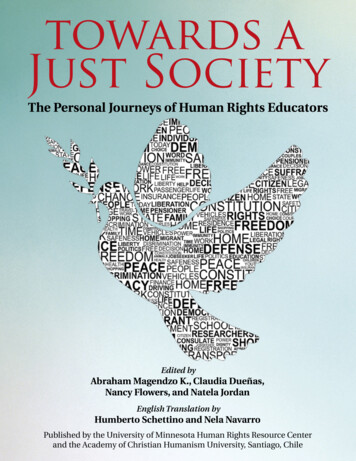
Transcription
towards aJust SocietyThe Personal Journeys of Human Rights EducatorsEdited byAbraham Magendzo K., Claudia Dueñas,Nancy Flowers, and Natela JordanEnglish Translation byHumberto Schettino and Nela NavarroPublished by the University of Minnesota Human Rights Resource Centerand the Academy of Christian Humanism University, Santiago, Chile
towards aJust SocietyThe Personal Journeys of Human Rights EducatorsEdited byAbraham Magendzo K., Claudia Dueñas,Nancy Flowers, and Natela JordanEnglish Translation byHumberto Schettino and Nela NavarroPublished by the University of Minnesota Human Rights Resource Centerand the Academy of Christian Humanism University, Santiago, Chile
Copyright 2015 University of Minnesota Human Rights Resource Center.All rights reserved. No part of this book may be reproduced, stored, or transmitted by any means—whether auditory, graphic,mechanical, or electronic—without written permission of both publisher and authors, except in the case of brief excerptsused in critical articles and reviews. Unauthorized reproduction of any part of this work is illegal and is punishable by law.Towards a Just Society: The Personal Journeys of Human Rights Educators may be reproduced without permission foreducational purposes only. Adapted material from this publication must include full citation of the source. Toreproduce for any other purposes, including the reproduction of images, a written request must be submitted to theHuman Rights Resource Center, University of Minnesota. Permission is granted for nongovernmental organizationsand non-profit groups to translate into other languages. The only conditions for other language versions are 1)that the language of the United Nations bodies appears in its entirety, 2) that no human rights are deleted, and3) that the Human Rights Resource Center receive a) notification of intention to translate, b) a hard copy of thetranslation, and c) an electronic version of the translation and permission to make it available on its website.University of Minnesota Human Rights Resource Center229 19th Avenue SouthMinneapolis, MN 554551-888-HREDUC8 humanrts@umn.eduwww.hrusa.orgISBN: 978-0-9964-5830-6 (sc)ISBN: 978-0-9675-3349-0 (e)Library of Congress Control Number: 2015915728Because of the dynamic nature of the Internet, any web addresses or links contained in this book may have changedsince publication and may no longer be valid. The views expressed in this work are solely those of the authors and donot necessarily reflect the views of the publisher, and the publisher hereby disclaims any responsibility for them.Cover image provided by Shutterstock.com.Lulu Publishing Services rev. date: 1/13/2016
About the Human Rights Education SeriesThe Human Rights Education Series is published by the University of Minnesota Human RightsResource Center. Edited by Nancy Flowers, the Series provides resources for the ever-growingbody of educators and activists working to build a culture of human rights in the United States andthroughout the world. Other publications in the series include:Human Rights Here and Now: Celebrating the Universal Declaration of Human RightsEdited by Nancy FlowersTopic Book #1: Economic and Social Justice: A Human Rights Perspectiveby David ShimanTopic Book #2: Raising Children with Roots, Rights and Responsibilities:Celebrating the UN Convention on the Rights of the Childby Lori DuPont, Joanne Foley, and Annette GagliardiTopic Book #3: Lesbian, Gay, Bisexual, and Transgender Rights:A Human Rights Perspectiveby David M. DonahueTopic Book #4: The Human Rights Education Handbook:Effective Practices for Learning, Action, and Changeby Nancy Flowers, Marcia Bernbaum, Kristi Rudelius-Palmer, and Joel TolmanTopic Book #5: Lifting the Spirit: Human Rights and Freedom of Religion or Beliefby the Tandem Project and the Human Rights Resource CenterTopic Book #6: Human Rights. Yes!Action and Advocacy on the Rights of Persons with Disabilities (2nd Ed.)by Janet Lord, Joelle Balfe, Allison deFranco, Katherine Guernsey, and Valerie KarrTopic Book #7: Acting for Indigenous Rights: Theatre to Change the Worldby Mariana Leal FerreiraTopic Book #8: Towards a Just Society:The Personal Journeys of Human Rights EducatorsEdited by Abraham Magendzo K., Claudia Dueñas, Nancy Flowers, and Natela Jordan
Towards a Just Society: The Personal Journeys of Human Rights Educatorsis dedicated to the memory of Edward O’Brien,a pioneer and inspiration for human rights educationin the USA and many other parts of the world.His vision and commitment to social justice touched many lives.
Table of ContentsAcknowledgments. . . . . . . . . . . . . . . . . . . . . . . . . . . . . . . . . . . . . . . . . . . . iUsing Towards a Just Society for Learning and Reflection. . . iiiIntroduction: Why Are We Human Rights Educators? . . . . . . . . 1Abraham Magendzo K. Utopia Makes the Journey Possible . . . . . . . . . . . . . . . . . . . . . . . . . . 3Rosa María Mujica Barreda (Peru) xperiences, Quests, and Conquests:E Building a Commitment to Human Rights Education . . . . . . . . 13Vera Maria Candau (Brazil) ntanglements and Efforts: Towards a Commitment toEHuman Rights Education . . . . . . . . . . . . . . . . . . . . . . . . . . . . . . . . . . . 20Nélida Céspedes (Peru) ll the Women I Have Been: The History of anA Educator’s Training and Program of Action . . . . . . . . . . . . . . . . . 27Silvia Conde (Mexico) Education for Peace: Signs along the Road . . . . . . . . . . . . . . . . . . 38Enver Djuliman (Bosnia, Norway)I n My Own Voice: Stories and Musings to Reflect onHuman Rights Education . . . . . . . . . . . . . . . . . . . . . . . . . . . . . . . . . . . 45Mónica Fernández (Argentina) he Road Less Traveled: Odyssey of a Human RightsTEducator . . . . . . . . . . . . . . . . . . . . . . . . . . . . . . . . . . . . . . . . . . . . . . . . . . . 55William R. Fernekes (USA)
The Integrative Power of Human Rights Education . . . . . . . . . 61Nancy Flowers (USA) Closing the Gap of Dignity . . . . . . . . . . . . . . . . . . . . . . . . . . . . . . . . . . 65Shulamith Koenig (Israel, USA) W hy Did I Become a Human Rights Educator? . . . . . . . . . . . . . . 80Elena Ippoliti (Italy, Switzerland) mpowerment! A Dialogue on Why We Are I nvolved inEHuman Rights Education . . . . . . . . . . . . . . . . . . . . . . . . . . . . . . . . . . . 83Judy Gummich and Claudia Lohrenscheit (Germany) uman Rights Educators:HSubjects of Their Own History . . . . . . . . . . . . . . . . . . . . . . . . . . . . . . 99Abraham Magendzo K. (Chile) W hy I Am a Human Rights Educator? . . . . . . . . . . . . . . . . . . . . . . 111Edward O’Brien (USA) idening Educational Horizons: Critical Plans forWEducation for Peace and Human Rights . . . . . . . . . . . . . . . . . . . . 113Greta Papadimitriou (Mexico) Engaging People through Human Rights Education . . . . . . . . 121Jefferson R. Plantilla (Philippines, Japan) ducation: Justice, Freedom, Non-violence, Pastries,Eand Boleros . . . . . . . . . . . . . . . . . . . . . . . . . . . . . . . . . . . . . . . . . . . . . . . 133Aura Helena Ramos (Brazil) etters to Abraham: My Roots as a Human RightsLEducator . . . . . . . . . . . . . . . . . . . . . . . . . . . . . . . . . . . . . . . . . . . . . . . . . . 142Kristi Rudelius-Palmer (USA) Multicolored Fabric:AMy Life in Human Rights Education . . . . . . . . . . . . . . . . . . . . . . . 153Susana Sacavino (Argentina, Brazil)Teaching against Forgetting . . . . . . . . . . . . . . . . . . . . . . . . . . . . . . . 159Cosette Thompson (France, USA)
Shadow . . . . . . . . . . . . . . . . . . . . . . . . . . . . . . . . . . . . . . . . . . . . . . . . . . . 165Felisa Tibbitts (USA)Personal Narrative in Three Acts . . . . . . . . . . . . . . . . . . . . . . . . . . 167José Tuvilla Rayo (Spain)Appreciating Paolo Freire, Antonio Gramsci, andthis So-called Life: A Human Rights Educator’s Storyof Journeying out of Hegemony and Awakening theConscious Self. . . . . . . . . . . . . . . . . . . . . . . . . . . . . . . . . . . . . . . . . . . . . 181Feliece I. Yeban (Philippines) ife as an Educator for Human Rights and Peace:L A History of Conjunctions and Possibilities . . . . . . . . . . . . . . . . 194Anita Yudkin (Puerto Rico) Subjectivity and Truth in Memory . . . . . . . . . . . . . . . . . . . . . . . . . 207Manuel Restrepo Yustin (Colombia)Publication Partners . . . . . . . . . . . . . . . . . . . . . . . . . . . . . . . . . . . . . . 231List of Organization Websites. . . . . . . . . . . . . . . . . . . . . . . . . . . . . . 232About the Book. . . . . . . . . . . . . . . . . . . . . . . . . . . . . . . . . . . . . . . . . . . . 240
AcknowledgmentsFirst and foremost, we would like to acknowledge and thank the twenty-five authors, who sharedtheir personal narratives in Towards a Just Society: The Personal Journeys of Human Rights Educators.Their contributions to the field of human rights education and willingness to share their stories iswhat makes this publication unique. On behalf of all of the authors and project partners, we wouldlike to celebrate and recognize our families, friends, and colleagues, who support us as humanrights educators and allow our energy to flow toward our lifelong commitments and community.We are saddened by the loss of Edward O’Brien, a dear friend and colleague, who passed awaysuddenly as this book was about to be published. We dedicate Towards a Just Society to Ed and hislifetime of social justice work, and hope it will inspire a new generation of human rights educatorsand learners.We cannot express enough gratitude and appreciation to Abraham Magendzo for his vision,leadership, inspiration, and coordination of this publication. We are truly grateful to partner withAbraham and Universidad Academia de Humanismo Cristiano in order to have this publicationavailable in both Spanish and English.A project of this scope can only be envisioned and achieved when participants commit to workingas a strong, cohesive team. Certain individuals and institutions made unique contributions tothis publication, without which it could not have been realized. Dr. Richard De Lisi, Dean of theRutgers Graduate School of Education, provided funding for the translations of fifteen Spanishlanguage chapters, responding to a request by Dr. Mary Curran, Associate Dean of Local-GlobalPartnerships, and Bill Fernekes, Part-time Lecturer in the Educational Theory, Administrationand Policy Department. Once the funding was obtained, Nela Navarro, Associate Director of theRutgers Center for the Study of Genocide and Human Rights (CGHR), organized a team to completethe translations, with support from CGHR’s Director Alexander Hinton. We want to highlight thesignificant contribution of Nela Navarro in designing and overseeing the translation project andteam. Special thanks go to Dr. Humberto Schettino, a visiting scholar at the CGHR, for his thoroughwork on translating the chapters from Spanish into English.Nancy Flowers has played a substantial role as chief editor and reviewer of the English chapters andchapters translated from Spanish. She volunteered her time, skills, and insights to make Towards aJust Society: The Personal Journeys of Human Rights Educators a reality in both its Spanish and Englisheditions. Bill Fernekes provided essential assistance in reviewing and editing the book while sharingi
his expertise to move this project forward. This book would not have been possible without theirunwavering commitment. We are very thankful for their generosity.We would also like to acknowledge Natela Jordan who served as the English edition co-editor andproject manager. She was instrumental in drafting and finalizing the publishing agreements andcopyright permissions as well as reviewing and preparing the manuscript for publication. JolenaZabel and Grace Corry were also integral to the project in respectively coordinating copyrightapprovals and assisting in proofreading and editing.All in all, Towards a Just Society: The Personal Journeys of Human Rights Educators took a village ofcommitted human rights educators across the globe to support Abraham’s vision. We truly hopethat both the Spanish and English editions will encourage all human rights educators to share theirstories and foster cultures that promote and protect human rights throughout the world.Your Forever Partner in Human Rights Education,Kristi Rudelius-PalmerHuman Rights Education Series PublisherUniversity of Minnesota Human Rights Resource Centerii
Using T owards a Just Society for Learning and ReflectionThe personal narratives of these human rights educators make for engaging and inspiring reading.Their voices and stories are richly diverse, but share a common trajectory. All authors speak of thepeople and experiences that shaped their journeys to make human rights education (HRE) a life’swork.However, these personal narratives also provide valuable opportunities for learning and reflection.Below are some sample ways to use Towards a Just Society as a resource:History Many narratives depict major human rights crises of recent decades through the eyes ofindividuals deeply engaged in those struggles. Research a crisis described in this book, boththen and now. Has human rights played a role in improving people’s lives?Historically what human rights crises have been experienced in your own country or region?How were they dealt with? How were they resolved? Did human rights activism play a role?Use the experiences of the authors as models to determine if people in your own region,country, or area are undertaking similar or comparable actions.Human Rights Consider current world crises. Does the human rights framework offer an effective way toaddress them? Why or why not?The human rights system is sometimes criticized as being “Western” or “Christian” andtherefore inappropriate for some cultures. Do any narratives in this collection offer evidencefor or against these views? Are human rights truly universal?How can human rights principles stand up against armed violence, tyranny, or systematicdiscrimination?Why is it important for people to know their human rights?Education Are the problems of discrimination, racism, sexism, and other violations of human rightsdescribed by these authors evident in your own school, town, region, or country? How doyou know? What examples can you cite?iii
What principles for human rights education (HRE) can you derive from the goals andmethods described by these educators?What does it mean to have what one author describes as a “political commitment toeducation”?HRE aims at creating a “culture of human rights,” which means instilling the values ofhuman rights. Can education really change people’s values? If so, how?Many authors mention the influence of Brazilian educator Paolo Friere. Read about Friereand his books, Pedagogy of the Oppressed and Pedagogy of Hope. How do you see his thinkingreflected in the descriptions of HRE in this collection?Match the desired outcomes in the UN Declaration on Human Rights Education and Trainingwith the activities of the authors in the narratives. How well do the real-life experiences ofthe authors reflect the goals of the Declaration? Where do you see significant gaps betweenthe aspiration of the Declaration and present realities?How have governments and other state-sponsored entities attempted to support or hinderhuman rights education in specific countries? What patterns of response do we find fromnongovernmental organizations (NGOs) and other civil society organizations, as well asgovernment, to such challenges?Activism One goal of HRE is to empower people to stand up for their rights and the rights of others.Is education for action appropriate for young people in schools? Can a state educationalsystem really teach skills that might criticize or oppose state policy and action? Is HRE moreeffective or appropriate in informal education? Among adults?Many narratives trace the personal development of social conscience, dedication to socialchange, and commitment to building a culture of human rights through education. Whatare the principal factors that motivated and inspired these activists? What motivates andinspires you?What are some of the common personal attributes and experiences of the authors in thisbook?Why do you think the authors turned to human rights rather than some other means ofbringing about social change? Why did they believe HRE could bring about social change?What audiences were they trying to reach through HRE and why?Why do you think so much of the activism portrayed in these narratives is done by elementsof civil society, especially NGOs?Reflection What are the principle human rights issues in your own community? How could you addressthem? In what way could HRE help to improve conditions in your community? Consideradapting to your own context the learning activity “Taking the Human Rights eries/hrhandbook/activities/18.htm.iv
What has been your own personal response to injustice, discrimination, and human rightsviolations? Consider the learning activity ties/17.htm.Tell your own story!v
Introduction: Why Are We Human Rights Educators?Abraham Magendzo K.This book is composed of several human rights educators’ answers to a question we posed some timeago: “What are the personal motives that made you commit to human rights education?” Throughthis question we invited them to reconstruct their own stories and explore the profound reasonsthat made them choose this particular path.Some might question why we made this invitation. They could even ask: Isn’t this a futile academicexercise? Isn’t human rights education an obvious task that does not require any explanation? Whatis the purpose of delving into our personal stories? What do we gain as educators?In my opinion, there are several different reasons to justify why we human rights educators shouldexplore our personal histories and stories to identify the factors that made us commit to this field.1. First, I think about the intellectual and emotional effort to identify the reasons that webecame human rights educators. Articulating and sharing those reasons will make ourarguments more compelling to both our students and others with whom we might interact.They will come to understand that we do this work because it involves our entire humanity,our total being, and our sense of existence.2. Second, in the progression of our stories, histories, and experiences, we have been building,both implicitly and explicitly, an understanding of human rights. Consciously and sometimesunconsciously, we have allied ourselves with particular frames of reference and doctrines.We have not been neutral or indifferent. We have taken some positions. We have accepted orrefuted certain conceptions. To a great extent these positions have conditioned the content,the pedagogy, and the methodology of our educational practice in human rights. In myopinion, going deeper into this history marks us as critical educators, distances us fromcomplacent routine, and above all stops us from falling into blind and dogmatic ideologicalgeneralizations.3. I believe it is necessary to delve into our concept of human rights within the frameworks ofreference mentioned above. We should do this to guide our educational practice. Withouta doubt this practice will differ in its objectives, contents, and methodology, depending onour frames of reference. For example:1
t owa r d s a J u s t S o c i e t y Whether one’s main motivation is a commitment to education in human rights that islinked primarily to legal and normative aspects, a moral or religious doctrine, or ethicsgrounded in rational a priori principles; Whether one argues that human rights come from the exercise of Kantian reason orfrom an ethical-emotive vision of humanity; Whether one regards human rights as universally valid, or if one believes that they aresocial and historically conditioned to certain cultural settings and therefore that theirlegitimacy is valid only for those cultures and societies that gave rise to them; Whether one thinks that the knowledge of human rights rise basically from a “normativemodel” or from a “constructivist model.” In the former, knowledge emerges and isvalidated by an external authority that holds a “legitimated truth” that is transmittedby exposition. In the latter, the knowledge of human rights is built from contact withdaily life and from the personal and collective experience of the students; this impliesan exploratory, critical, and problematic pedagogy.4. I believe excavating our personal histories and the reasons that made us commit to humanrights education and sharing them with our colleagues and students will foster dialogue andcommunication among human rights educators. There is no better way to build networksof human rights educators than to immerse ourselves in the mutual understanding of eachother’s stories and histories. This allows us to know each other better. It also confirmsthat in spite of the fact that we have very different approaches to human rights, we form acommunity of interests and common destiny, linked to sensibilities that transcend us.5. Finally, I believe that an interesting collection of narratives by human rights researchers andeducators from diverse settings can provide valuable educational material for training andpromote debates about human rights education.Clearly, no single reason explains why people get involved in human rights education. Those whohave taken on this task probably have had many different motivations ranging from the rational,the emotional, the practical, the legal, and even the accidental. Their commitment will appear asthe result of many different factors, contexts, and situations that each has experienced in differentplaces and time. Nevertheless, I don’t think I’m mistaken in saying that in spite of the multiplicityof factors, there is always a central factor, a reason that articulates other reasons, a motivation thatstructures many other motivations, a set of ideas and experiences that have impacted us, touchedus, and left very profound marks on us. We have constituted ourselves as human rights educatorsas part of a personal and collective history that has woven the process of our existence out of manycomponents. There exist, however, a few aspects that have marked us, that have produced a fracture,and that have expanded our outlook.We have invited twenty-five educators who come from very different settings and who have workedin diverse locations on earth to think and write about their human rights education experiences.Each one had absolute freedom to write. We now invite the reader to encounter these stories thatboth converge and diverge. At the same time, we invite the readers to delve into their own stories,the stories that made them human rights educators.2
Utopia Makes the Journey Possible Rosa María Mujica Barreda (Peru)Rosa María Mujica Barreda has a bachelor’s degree ineducation with a minor in philosophy from the PontificalCatholic University in Peru. She has a long trajectory in thefields of education and human rights, developed mostly atthe Instituto Peruano en Educación en Derechos Humanosy la Paz (Peruvian Institute of Education on Human Rightsand Peace; IPEDEHP), an institution she helped establish.Between 2011 and 2014, she was director of rural educationat the Peruvian Ministry of Education.Life in a Large FamilyI was born in Lima to a well-to-do family that belonged to the old city aristocracy, a strict familywith clear-cut values and rules. My father was a lawyer and notary public, an honest, simple, warmman who was always willing to help those in need. My mother was a resilient woman who madeeveryone welcome to our house: sons and daughters, friends, neighbors, and later, grandchildrenwho filled her life with laughter and joy. She was the root in my family and my father the trunk.We had everything we needed at home, but we never squandered money or lived in excess. Myparents taught us to respect all individuals and told us that the poorer a person was, the betterwe should behave toward him or her. And never, for any reason, should we accept injustice or themistreatment of anyone.I am the fourth of eight children: four brothers and four sisters. We were a big and noisy family,with diverse ways of seeing the problems and solutions of the world. Debate and discussion weremain ingredients at our Saturday lunches. One Saturday afternoon after lunch, a friend who hadparticipated in one of our weekly discussions said, quite wide-eyed, “I am amazed by the freedomin your home. Only in an atmosphere of freedom can the diversity that I have seen here todaybloom.” At that moment, I became aware of the truth of what he was saying. Each one of us foundour own way forward, and our parents respected all of us, even though in some cases they did notagree with our decisions.3
t owa r d s a J u s t S o c i e t yValues were an important part of our upbringing, and family unity was one of them. Collectiveactivities, excursions, parties, and dinners with friends were always encouraged. Our parents’ lastwish before they died was for us to remain close.Literacy or the Beginning of CommitmentFrom a very early age, and undoubtedly because of my family’s influence, I chose to work with theless fortunate. My parents were both practicing Catholics who constantly tried to help those in need.My mother worked as a volunteer with poor women in what at the time were called the barriadas(slums) in Lima, so that they could improve their income. She taught them to knit baby robes thatshe would later clean and sell so that they could have some additional income to allow them to meettheir basic daily needs.She used to say that she had blind faith. She believed in God, and that was that, so she had to live agood life and help those in need. My father, a notary public in Lima, was well known for working forfree on behalf of the needy. As an anecdote, a few days after he died, I gave a talk in Villa El Salvador,and one of the organizers asked me if I was related to “Don Elías.” When she learned he was myfather, she made a moving public tribute. She recalled that every time she went to his office, “I wastreated like a queen.” It was the only place where she did not feel poor or displaced. Her testimonywas the best homage he could ever have received.I studied in a school run by nuns of the Sacred Heart, where my mother and grandmother hadalso studied. From very early on, we learned the real meaning of solidarity, commitment, andresponsibility. We learned that being a Christian meant helping others, especially those who werepoorer and weaker. This meant working in the slums in the Chorrillos district close to our school.Every Saturday, we gave literacy and early-development lessons to boys and girls who gathered inthe parish. It was then that we began visiting the women of the Chorrillos penitentiary and helpingin its nursery. “Duty before all, duty forever” was one of the maxims we followed, which influencedour upbringing and left a deep impression in our minds.In high school, I was invited by a group of students from the Catholic University to work in anotherslum. The government had decided to change the name barriadas (shantytown) to pueblos jóvenes(young towns). The one I visited was called Comuco and stood at the heart of one of the wealthiestdistricts of Lima, Miraflores. Every Saturday we had training, literacy, and early-developmentsessions with both children and adults from the area. This new experience made me question manyissues, for it allowed me to see and feel the contradiction between those who lived outside the slumwalls and the extreme poverty inside the walls of Comuco.It was there that I met the man who would become my husband. He was in charge of a group ofyoung dreamers, all convinced that we could promote justice and change our country. He taught meto understand my work with the poor sectors of society and encouraged me to take my commitmentfurther, to make it a way of life.4
Utopia Makes the Journey PossibleWhen I left high school, I enrolled in general literature studies at the Pontifical Catholic University. Itwas there that this commitment, which had been more an emotion than a conscious or well-reasoneddecision, compelled me to work for popular literacy and help strengthen peasant organizations in thenorth of Lima. The Ministry of Education, which was in charge of this work, was in the midst of avery interesting process of reform that encouraged the students’ commitment to popular education.The reform was headed by a group of brilliant educators coordinated by Augusto Salazar Bondy.Readings and debates were the order of the day, from Herman Hesse to José María Arguedas, ErichFromm to Margaret Mead. Paulo Freire’s work made us feel enthusiastic. Gustavo Gutiérrez andliberation theology confirmed our intuition
Topic Book #2: Raising Children with Roots, Rights and Responsibilities: Celebrating the UN Convention on the Rights of the Child by Lori DuPont, Joanne Foley, and Annette Gagliardi Topic Book #3: Lesbian, Gay, Bisexual, and Transgender Rights: A Human Rights Perspective by David M. Donahue Topic Book #4: The Human Rights Education Handbook:
